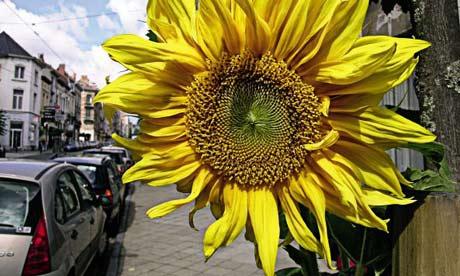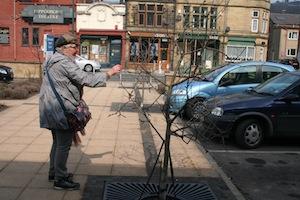Food Sovereignty
'Food Sovereignty is the right of peoples to healthy and culturally appropriate food, produced through ecologically sound and sustainable methods, and their right to define their own food and agriculture systems.' Declaration of Nyeleni in 2007.
It is a solutions focused framework that defines core principles for which a sustainable, life-supporting food system would be based on. Food Sovereignty has emerged from international peasant movements under the banner of La Via Campesina in the Global South.
Many groups in Somerset are active in the wider Food Sovereignty movement, and anyone active for a sustainable food system should be aware of their power and impact around the world.
Principles of Food Sovereignty
1. Focuses on Food for People: Food sovereignty stresses the right to sufficient, healthy and culturally appropriate food for all individuals, peoples and communities, including those who are hungry or living under occupation, in conflict zones and marginalized. Food sovereignty rejects the proposition that food is just another commodity for international agribusiness.
2. Values Food Providers: Food sovereignty values and supports the contributions, and respects the rights, of women and men, peasants and small scale family farmers, pastoralists, artisanal fishers, forest dwellers, indigenous peoples and agricultural and fisheries workers, including migrants, who cultivate, grow, harvest and process food; and rejects those policies, actions and programs that undervalue them, threaten their livelihoods and eliminate them.
3. Localizes Food Systems: Food sovereignty brings food providers and consumers together in common cause; puts providers and consumers at the center of decision- making on food issues; protects food providers from the dumping of food and food aid in local markets; protects consumers from poor quality and unhealthy food, inappropriate food aid and food tainted with genetically modified organisms; and resists governance structures, agreements and practices that depend on and promote unsustainable and inequitable international trade and give power to remote and unaccountable corporations.
4. Makes Decisions Locally: Food sovereignty seeks control over and access to territory, land, grazing, water, seeds, livestock and fish populations for local food providers. These resources ought to be used and shared in socially and environmentally sustainable ways which conserve diversity. Food sovereignty recognizes that local territories often cross geopolitical borders and advances the right of local communities to inhabit and use their territories; it promotes positive interaction between food providers in different regions and territories and from different sectors to resolve internal conflicts or conflicts with local and national authorities; and rejects the privatization of natural resources through laws, commercial contracts and intellectual property rights regimes.
5. Builds Knowledge and Skills: Food sovereignty builds on the skills and local knowledge of food providers and their local organizations that conserve, develop and manage localized food production and harvesting systems, developing appropriate research systems to support this and passing on this wisdom to future generations. Food sovereignty rejects technologies that undermine, threaten or contaminate these, e.g. genetic engineering.
6. Works with Nature: Food sovereignty uses the contributions of nature in diverse, low external input agroecological production and harvesting methods that maximize the contribution of ecosystems and improve resilience and adaptation, especially in the face of climate change. Food sovereignty seeks to heal the planet so that the planet may heal us; and, rejects methods that harm beneficial ecosystem functions, that depend on energy intensive monocultures and livestock factories, destructive fishing practices and other industrialized production methods, which damage the environment and contribute to global warming.
Source: Nyéléni 2007 - Forum for Food Sovereignty, 2007, Sélingué, Mali, Synthesis Report.
Further information & resources
Articles, factsheets & reports
Nyeleni 2007 Definition of Food Sovereignty
Nyeleni European Declaration from the European Forum in Krems, Austria, August 2011
Primer on People's Food Sovereignty
Food Sovereignty: Towards democracy in localised food systems, Michael Windfuhr and Jennie Jonsén FIAN-International
Books
Food Sovereignty, Reconnecting Food, Nature and Community, edited by Hannah Wittman, Annette Aurelie Desmarais & Nettie Wiebe, Food First Books, Oakland, US 2010
Introduction to Food Sovereignty. Food and Democracy edited by Marcin Gerwin (free e-book)
Local Food: How to make it happen in your community, Tazmin Pinkerton & Rob Hopkins
Fatal Harvest: The Tragedy of Industrial Agriculture, edited by Andrew Kimbrell
Websites
Landworkers Alliance
Reclaim the Fields
Guerilla Gardening
The Federation of City Farms and Community Gardens writes:
Guerrilla gardening is a type of anarchic direct action where gardeners identify a disused, neglected or abandoned piece of land - which they do not own - and use it to grow either crops, flowering plants or to create wildlife areas. The aim is simply to rescue land from perceived neglect or misuse and give it a fresh purpose.
Some guerrilla gardening activities are secretive and technically illegal, sometimes carried out under the cover of night. They can also be subversive and aimed at delivering a strong message to statutory authorities, such as the creation of wildflower gardens on barren roundabouts or where potholes in roads are filled with soil and planted with flowers.
The idea has spread throughout the world, with guerrilla gardening becoming particularly popular in urban areas. Here the desire to reclaim public space can range from 'seed bombing' - where a clay seed ball containing a mixture of clay soil, compost, seeds and water is thrown onto a patch of land inaccessible land - through to creating a whole community garden.
There are critics of guerrilla gardening. Some say that illegal activities which bypass legislation and official sanction should be discouraged. There is also criticism that guerrilla gardening is more about quick fixes and impact, rather than a meaningful solution to problems associated with land use.
However, one of the pioneers of guerrilla gardening in the UK, Richard Reynolds, said that he believed guerrilla gardening would continue to flourish as a result of the gloomy economic climate, particularly as people search for land to grow their own food. "There is an increasing realisation that the focus on our personal betterment is not making us happy," he said. "Going out there and taking responsibility for a shared space with other people, on the other hand, can warm the soul."
Getting started
The benefits of Guerilla Gardening are that you don't need the organisational structure, bureaucracy or long-winded grant applications to get started! All you need is some compost, plants, bed-making materials and tools to transform a piece of land anywhere.
Inspiring examples in Somerset & beyond
There has been some DIY growing on Glastonbury High Street and areas such as Frome have an active Incredible Edible Group, which is reclaiming and transforming land in the town.
Links & Resources
- http://www.guerrillagardening.org/
- https://www.facebook.com/groups/4605708492/
- http://thepotholegardener.com/
- http://www.wikihow.com/Start-Guerrilla-Gardening
- Guerrilla gardening and reclaiming urban spaces / RHS
- Smiley Movement | Guerilla Gardening: planting without permission –…

Incredible Edible Todmorden is an ecology of diverse projects, activities and enterprises, nestling in a small town in a Yorkshire valley. A growing group of volunteers have been involved with:
- Propaganda gardening - planting food in public spaces, with a 'Green Route Map', that makes growing spots visible and helps support the vegetable tourists find their way round!
- Community growing in town - from orchards to beds and gardens in health centres, train stations, churchyards and more.
- Branding blackboards to support local producers
- A Food Hub - to support a local food-based social enterprise launch in a local school, providing apprenticeships and new jobs.
- Incredible Edible Pennine - an initiative with a local housing association to make free seeds and advice available to more than 500 tenants
- A cookbook
- An Incredible Edible Farm, which is also a training centre for market gardeners of the future
- A huge amount of education projects, including works with schools, in adult learning, local food festival, cooking in the street and more.

Their ultimate aim is to increase the amount of local food grown and eaten in the town. But its clear they have other agendas too - mainly kindness and social justice.
Attitudes IET runs on values: passion, love, kindness, determination, hospitality, the desire to share not only food but information, overlooking outdated obstacles, focusing on making immediate positive changes and the power of small actions and challenging society's fear of the 'other'. They clearly love what they do and aren't afraid of the long haul, they take a long term view 'this story is still being written'. They value inclusion 'if you eat, you're in' and create lots of opportunities for action.
Visibility You can see the power of visibility - for example, the Green route signs were a beautiful mixture of art, growing and education, the banner and chalkboards for local producers in the market, all make local food and the IET 'brand' visible.
Growing tips including which plants have been successful in public spaces. Learning that edible landscapes are just as ambient as conventional one. We saw the power of having gardens in town, on the high street, in public places, in a way that is different to distant market gardens or farms.
Impact IET has inspired thousands of relationships and conversations around food growing locally, nationally and internationally. Starting small with a clear focus, has had all these unexpected effects and positive impacts worldwide.
Skill & Privilege Its clear there are huge opportunities for community engagement in Todmorden, and a real sense of ownership in the town. The group are visibility making a difference and working with diverse groups of people. However it is clear there is a skilled core group driving IET, who have a background in community organising, awareness of existing networks, knowledge of how to access grants a and the privilege of time, through being retired or embracingly unemployed. No doubt these driving members invest a huge amount of time, love and energy into IET and it really shows.